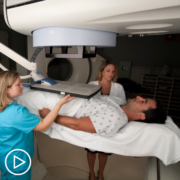Advances in Prostate Cancer Imaging
Advances in Prostate Cancer Imaging from Patient Empowerment Network on Vimeo.
Expert Dr. Tanya Dorff reviews the latest advances in prostate cancer imaging and explains the potential impact on patient care.
Related Resources:

|

|

|
Transcript:
Katherine:
Yeah. George wants to know, “Are there any advances in imaging that patients should know about?”
Dr. Dorff:
Yes. So, the PSMA PET scans – so, these are a nuclear medicine imaging that looks for prostate cancer using a protein called PSMA, and there are several of them, there’s the F-18-based one called Pylarify, and then there are the Gallium-68 versions, Illuccix and Locametz, so those have been revolutionary. They can see prostate cancer in much smaller quantities, so we use them a lot for rising PSA after prostate surgery or radiation to see where is his small amount of cancer, and hopefully, we can treat it better by seeing it earlier.
They are also now being used to select patients for potential benefit from a treatment like Lutetium-177-PSMA, which obviously won’t work if the cancer doesn’t have that protein, so the imaging helps see who’s got the protein, who can benefit from the treatment. So, that’s the biggest imaging advance. There are some others, like using MRI fused to ultrasound for prostate biopsy at diagnosis. There’s also another kind of PET scan called a fluciclovine PET scan, which we still sometimes use because not 100 percent of prostate cancers have PSMAs, so sometimes we need something a little bit different.










